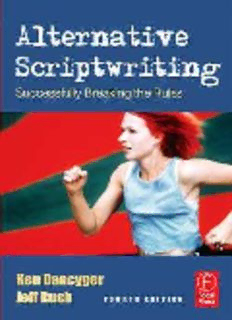
Alternative Scriptwriting: Rewriting the Hollywood Formula PDF
Preview Alternative Scriptwriting: Rewriting the Hollywood Formula
Alternative Scriptwriting: Successfully Breaking the Rules Fourth Edition Alternative Scriptwriting: Successfully Breaking the Rules Ken Dancyger and Jeff Rush AMSTERDAM • BOSTON • HEIDLEBERG • LONDON NEW YORK • OXFORD • PARIS • SAN DIEGO SAN FRANCISCO • SINGAPORE • SYDNEY • TOKYO Focal Press is an imprint of Elsevier Acquisitions Editor: Elinor Actipis Project Manager: Paul Gottehrer Assistant Editor: Robin Weston Marketing Manager: Christine Degon Veroulis Cover Design: Eric DeCicco Book Production: Borrego Publishing (www.borregopublishing.com) Focal Press is an imprint of Elsevier 30 Corporate Drive, Suite 400, Burlington, MA 01803, USA Linacre House, Jordan Hill, Oxford OX2 8DP, UK Copyright © 2007, Elsevier Inc. All rights reserved. No part of this publication may be reproduced, stored in a retrieval system, or transmitted in any form or by any means, electronic, mechanical, photocopying, recording, or otherwise, without the prior written permission of the publisher. Permissions may be sought directly from Elsevier’s Science & Technology Rights Department in Oxford, UK: phone: (+44) 1865 843830, fax: (+44) 1865 853333, E-mail: [email protected]. You may also complete your request on-line via the Elsevier homepage (http://elsevier.com), by selecting “Support & Contact” then “Copyright and Permission” and then “Obtaining Permissions.” Recognizing the importance of preserving what has been written, Elsevier prints its books on acid-free paper whenever possible. Library of Congress Cataloging-in-Publication Data Application submitted British Library Cataloguing-in-Publication Data A catalogue record for this book is available from the British Library. ISBN 13: 978-0-240-80849-9 ISBN 10: 0-240-80849-5 For information on all Focal Press publications visit our website at www.books.elsevier.com 07 08 09 10 10 9 8 7 6 5 4 3 2 1 Printed in the United States of America For Ida For Ilene Contents Preface ix Acknowledgments for the Fourth Edition xi Acknowledgments xiii Chapter 1 Beyond the Rules 1 Chapter 2 Structure 16 Chapter 3 Critique of Restorative Three-Act Form 29 Chapter 4 Counter-Structure 38 Chapter 5 More Thoughts on Three Acts: Fifteen Years Later 48 Chapter 6 Narrative and Anti-Narrative: The Case of the 58 Two Stevens: The Work of Steven Spielberg and Steven Soderbergh Chapter 7 Working with Genre I 76 Chapter 8 Working with Genre II: The Melodrama 97 and the Thriller Chapter 9 Working Against Genre 120 Chapter 10 Genres of Voice 142 Chapter 11 The Non-Linear Film 154 Chapter 12 Reframing the Active/Passive Character Distinction 164 Chapter 13 Stretching the Limits of Character Identification 177 Chapter 14 Main and Secondary Characters 190 Chapter 15 Subtext, Action, and Character 200 Chapter 16 The Primacy of Character Over Action: 213 The Non-American Screenplay Chapter 17 The Subtleties and Implications of Screenplay Form 227 Chapter 18 Agency and the Other 247 Chapter 19 Character, History, and Politics 268 Chapter 20 Tone: The Inescapability of Irony 289 Chapter 21 Dramatic Voice/Narrative Voice 311 Chapter 22 Digital Features 319 Chapter 23 Writing the Narrative Voice 335 Chapter 24 Rewriting 344 viii Alternative Scriptwriting Chapter 25 Adaptations from Contemporary Literature 352 Chapter 26 Personal Scriptwriting: The Edge 365 Chapter 27 Personal Scriptwriting: Beyond the Edge 381 Index 391 Preface Alternative Scriptwriting: Successfully Breaking the Rules celebrates a mul- titude of approaches to screenwriting and ilmmaking. Beginning with a reevaluation of the much-discussed issue of three-act structure, this book proceeds to encourage the writer to consider alternative approaches to both conventional and offbeat ilm stories. Alternative Scriptwriting takes a mixed-genre approach not only to its content, but also to its form. Theory and practice are intentionally inter- mingled to suggest the mixture of intellectual context and inchoate intuition with which the writer works. Key issues, exceptions, case studies, and ex- ercises are included and are designed to encourage the writer to experiment with the broad range of narrative and dramatic practices that make up our long history of storytelling. Finally, because this is a book about differences in writing, the co-authors have not smoothed over the occasional, minor divergences between their per- spectives and writing styles. Rather than detract from the text, these differ- ences serve to reinforce their beliefs that there can be no single, right approach to an art form that, like all art forms, thrives on exception rather than rule. Introduction to the Fourth Edition In the irst edition of Alternative Scriptwriting we introduced ideas about genre scriptwriting—the motifs and how to challenge those mo- tifs, or working against genre. Through the next two editions those ideas were ampliied and added to. In this edition we add chapters on genres that highlight the voice of the author and the non-linear story, the most open- architecture version of a genre that pushes voice over the more traditional uses of narrative tools. These chapters explore one of the most signiicant phenomena of ilmic storytelling of the past 15 years. The ilm industry has become increasingly polarized these past 15 years. At one extreme, there is the tent-pole ilm, or conservative storytelling, which does not always represent ilmmaking at its best. At the other extreme there is the small independent production. Writers such as Soia Coppola, Charlie Feldman, Paul Haggis, and Alan Ball represent the latter impulse. Add to this ix
Description: